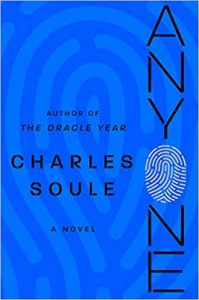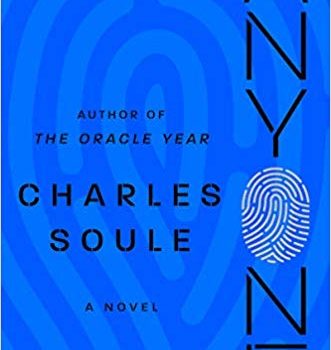Ian Mond and Gary K. Wolfe Review Anyone by Charles Soule
 Anyone, Charles Soule (Harper Perennial 978-0062890634, $21.99, 400pp, hc) December 2019.
Anyone, Charles Soule (Harper Perennial 978-0062890634, $21.99, 400pp, hc) December 2019.
I’ve been avidly reading Charle Soule’s work since I ended my decades-long comics book hiatus in 2011. I began with Soule’s run on DC’s Swamp Thing and then, when I migrated to Marvel comics, enjoyed his take on Thunderbolts, the Inhumans, and Daredevil. I was particularly fond of his creator-owned series, the wildly inventive and gonzo Letter 44 (from Oni Press). I never got around to reading Soule’s debut novel The Oracle Year (published in 2018), but I’ve made an effort to pick up his second book, Anyone, curious to see if the storytelling chops and vibrant imagination evident in his comics translates to prose. (Spoiler: it does).
Anyone opens on a farm in Michigan where Gabrielle White’s highly experimental research into a cure for Alzheimer’s, which uses the “language of light” powered by a laser to re-educate the brain, has come to a dead end. Out of cash, and with nothing to show her investor – Hendricks Capital – Gabrielle runs the experiment one more time, pushing the equipment to its limit. A burst of laser light splashes a pattern against the wall of her makeshift lab and the next thing Gabrielle knows her conscious mind has transferred into the body of her husband. Skip 25 years, and “Flash” has become mainstream. An intricate network has been established that allows people to travel anywhere across the world, instantaneously, into the body of a willing recipient (or vessel). The technology is so ubiquitous that it has “reduced overall energy consumption by a third, enough of an edge that alternative power sources and a concerted effort to reduce carbon output… literally save[s] the world.” Unsurprisingly, there is an underbelly to Flash, a “darkshare” where people allow themselves to be occupied by a “rider” who may use their body for whatever they desire – “drugs, sex, crime – anything.” That’s where we meet Annami. Young and attractive, with a high-paying job for NeOnet Global – the Facebook-like monopoly that controls the Flash – she’s the last person you’d expect to see in a darkshare den preparing to have a stranger take control of her body. Annami needs the cash to enact her revenge against NeOnet Global, and specifically it’s charismatic CEO, Stephen Hauser. The novel toggles between these two time periods: Gabrielle’s extraordinary discovery, and her moves to keep it a secret from Hendricks Capital (whom she doesn’t trust to use the technology wisely) and Annami’s incredibly risky mission to overturn a monolith, but also reveal to the world the dark, violent history of Flash.
The storytelling nous that makes Soule’s comics so damn entertaining is abundantly evident in Anyone. It’s not just the thrills he evokes from full-colour, splash-page action scenes and the sort of ruthless villainy that would make the Kingpin proud (I’m looking at you Gray Hendricks) but also how he leverages the reader’s knowledge of the future to upend assumptions about the past. For example, I thought I had Annami’s true identity pegged, only to discover that while I was partly correct the reality is far more horrible and disturbing then I’d envisioned. Similarly, while I knew at some point Soule would undercut the cast-iron rules that define Flash – “If one dies, both die… [and] no multiple jumps. If you’re in a vessel, you can’t move to a second without flashing back to your prime first” – when he does break the rules it not only deepens our understanding of the technology, it reveals truths about the characters that are tragic and shocking.
In addition to the hurly-burly action and twists, Soule inserts a series of interludes that chart the advancement of Flash over two-decades. The most effective of these vignettes occur toward the end of the novel, a heartfelt op-ed from Doctor Chen Zhang Min who, due to her age, will shortly be forced to stop using the NeOnet network. She considers how Flash has changed the world for the better (“the external doesn’t matter so much… it’s harder to hate someone if you can be them”) and the new problems it has created (“We define ourselves by where the flash allows us to go. And by extension where Stephen Hauser allows us to go.”). Her sentiments echo our current challenge with all too powerful companies like Facebook and remind us of humanity’s poor track record – even with the best of intentions – in managing the unintended consequences of technological progress. I would have gladly sacrificed an action set-piece or two for a couple more of these thoughtful snippets of worldbuilding.
Anyone‘s abrupt, almost unfinished climax raises several fascinating philosophical possibilities. It also suggests there’s more story to tell and, while I don’t generally advocate for sequels, I’m desperate to know what happens next.
–Ian Mond
This review and more like it in the December 2019 issue of Locus.
I’ve long been intrigued by how writers of technothrillers manage to refurbish some of SF’s hoariest tropes into shiny new suspense novels – Michael Crichton turning a space plague into The Andromeda Strain is a classic example – and have come to suspect that one of the more effective techniques for doing this is sheer bluster: keep the plot moving fast enough, the stakes high enough, and the villains villainous enough, and no one has much time to worry about the details. Charles Soule, who earned an impressive reputation in comics before making a splash with his debut novel The Oracle Year in 2018, manages all this with considerable energy in Anyone, which is just entertaining enough to permit you – almost – to overlook the old ideas and pulp-era villains that it’s assembled from. The basic conceit is that of identity transfer – the notion that someone else’s mind might take over your body for limited periods, or that you might “jump” into someone else’s body – and it’s been a staple of SF and horror at least since H.G. Wells’s “The Story of the Late Mr. Elvesham”, showing up in work by everyone from Lovecraft to Robert Sheckley, Frederik Pohl, Robert Silverberg, John Scalzi, Richard Morgan, and – well, the list could go on, not even counting the various supernatural tales of psychic possession and mind control. Soule’s major contribution to this tradition is in showing, in terms that are at times genuinely chilling, how such a technology might be abused by venal corporate overlords – who themselves are pretty familiar figures in this sort of fiction. After all, what good is an SF idea in a thriller if you can’t misuse it?
But there are some surprisingly old-fashioned notions in the novel before the corporate bad guys even step out of their black limos. Anyone begins with a lone scientist working out of a personal laboratory in rural Michigan, trying to develop a treatment for Alzheimer’s, which somehow involves high-powered lasers. This, of course, recalls the way home-made science was done in The Skylark of Space more than any recognizable form of contemporary research, but Soule offers some cosmetic updates by making his scientist, Gabby White, a black woman, and by having her funded by an ambitious venture capitalist. Just as her funding is running out, the experiment goes awry and she finds herself inside her husband’s body, with his mind apparently on hold and her own body left comatose in the barn. Soule then introduces a second narrative line, 25 years in the future, in which the mind-transfer technology, called “flashing,” now proprietary to a megacorporation called Anyone, has become about as ubiquitous as Snapchat. A young woman named Annami is working as a kind of body-sharing prostitute in the “darkshare,” the flash version of the dark web. She’s trying desperately to raise a half-million dollars, for reasons that will soon become apparent. Much of the suspense in the first half of the novel lies in learning how these two narratives will eventually braid together, and Soule handles this with admirable skill, even though many readers will likely see it coming a mile away. (Still, watching a novel play out its inevitable string can be entertaining in its own right, even if it requires a bit of patience in the middle chapters.)
This is where the priorities of the thriller clearly begin to overshadow the underlying SF ideas. Annami wakes up in a body soaked in someone else’s blood, and is soon on the run from a killer, who literally bursts into the room carrying a gun, as though following Raymond Chandler’s ancient parody of hardboiled formula (“When in doubt, have a man come through a door with a gun in his hand”). We get several pages of a harrowing chase, into which is dropped, almost at random, the anomalous observation that “widespread adoption of the flash reduced overall energy consumption on the planet by a third, enough of an edge that alternative power sources and a concerted effort to reduce carbon output had, literally, saved the world.” Later, again on the run, Gabby briefly pauses to speculate about what the flash technology might imply about identity, gender, consciousness, memory, even the idea of immortality. Throughout the novel, these hints at a radically transformed future are dropped almost as afterthoughts, as the narrative remains firmly focused on pursuits, tortures, hairsbreadth escapes, and really odious antagonists who often talk with the almost comical arrogance of Bond villains. “When this city’s mine, they’re all going to go,” says one, whose peculiar ambition is not world domination, but just fixing up Detroit (it’s the casinos that are going to go). The other corporate villain, who does harbor longer-term plans, is supported by an over-the-top henchman named Bleeder and his team, the Eaters, which sounds like your next favorite death-metal band.
Soule does set up some SF-style rules governing the body transfer technology: both sender and vessel die if either body dies, you can’t hop from one inhabited body to the next, you can’t flash if you’re too old or too disabled – but each of these rules is enforced only until the thriller plot needs them not to be. This might annoy readers who prefer their SF rigorous, but Soule’s main interest is less in his ideas than in his action, and he keeps the action going at a roller-coaster pace, while Gabby makes a likeable, if at times surprisingly naïve, researcher-turned-action-hero. The mixture may not offer much new in terms of SF, but it’s almost certainly going to give him a bestseller.
-Gary K. Wolfe
This review and more like it in the January 2020 issue of Locus.
Gary K. Wolfe is Emeritus Professor of Humanities at Roosevelt University and a reviewer for Locus magazine since 1991. His reviews have been collected in Soundings (BSFA Award 2006; Hugo nominee), Bearings (Hugo nominee 2011), and Sightings (2011), and his Evaporating Genres: Essays on Fantastic Literature (Wesleyan) received the Locus Award in 2012. Earlier books include The Known and the Unknown: The Iconography of Science Fiction (Eaton Award, 1981), Harlan Ellison: The Edge of Forever (with Ellen Weil, 2002), and David Lindsay (1982). For the Library of America, he edited American Science Fiction: Nine Classic Novels of the 1950s in 2012, with a similar set for the 1960s forthcoming. He has received the Pilgrim Award from the Science Fiction Research Association, the Distinguished Scholarship Award from the International Association for the Fantastic in the Arts, and a Special World Fantasy Award for criticism. His 24-lecture series How Great Science Fiction Works appeared from The Great Courses in 2016. He has received six Hugo nominations, two for his reviews collections and four for The Coode Street Podcast, which he has co-hosted with Jonathan Strahan for more than 300 episodes. He lives in Chicago.
 While you are here, please take a moment to support Locus with a one-time or recurring donation. We rely on reader donations to keep the magazine and site going, and would like to keep the site paywall free, but WE NEED YOUR FINANCIAL SUPPORT to continue quality coverage of the science fiction and fantasy field.
While you are here, please take a moment to support Locus with a one-time or recurring donation. We rely on reader donations to keep the magazine and site going, and would like to keep the site paywall free, but WE NEED YOUR FINANCIAL SUPPORT to continue quality coverage of the science fiction and fantasy field.








